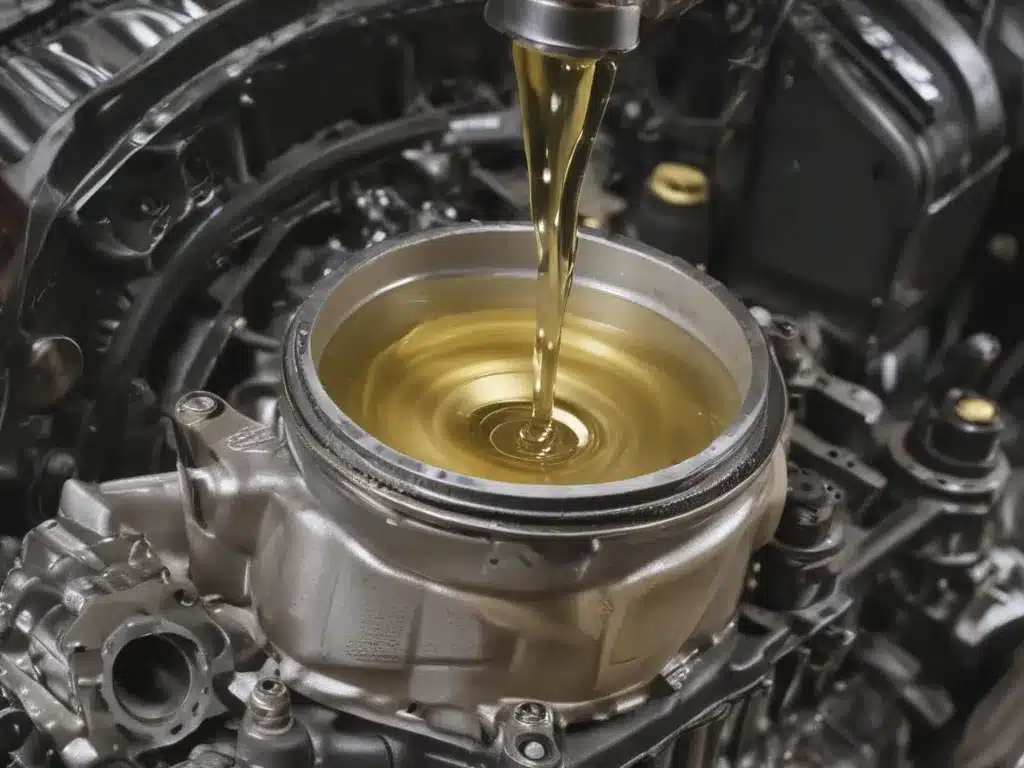
The Rattling Symphony
Ah, the sweet sounds of a well-oiled engine – the gentle hum, the soothing purr, the occasional satisfying clunk as the pistons do their thing. But what happens when that symphony turns into a discordant cacophony of rattles, clanks, and the dreaded ticking? Well, my friends, that’s where thicker oils come into play.
You see, as our trusty engines age, the clearances between all those moving parts can start to…well, get a bit loose. And when that happens, all sorts of unhappy noises can arise. But fear not! By using a thicker, higher-viscosity oil, we can tighten things up and restore some much-needed harmony under the hood.
The Viscosity Balancing Act
Now, I know what you’re thinking – “Thicker oil? Won’t that just make my engine sluggish and reduce fuel efficiency?” And you’d be right to ask that. It’s all about finding that delicate balance between viscosity and performance.
You see, the viscosity of an oil (that’s a fancy way of saying how thick or thin it is) plays a crucial role in how it behaves in your engine. A thinner oil will flow more easily, reducing friction and improving fuel economy. But it might not provide enough of a protective “cushion” between those moving parts, leading to increased wear and tear over time.
On the other hand, a thicker oil can help fill in those gaps and reduce engine noise, but if it’s too thick, it might start to struggle to circulate properly, leading to increased drag and reduced efficiency. It’s kind of like trying to stir peanut butter versus maple syrup – one’s gonna be a lot easier than the other.
The Right Oil for the Job
So, how do you find that sweet spot? Well, it all comes down to doing your research and matching the right oil viscosity to your engine’s needs. Most manufacturers will recommend a specific oil grade – say, 5W-30 or 10W-40 – based on the design and age of your engine.
But here’s the thing – those are just starting points. If you’ve got an older engine with some extra clearance, you might find that stepping up to a thicker 10W-30 or even a 20W-50 can help quiet things down a bit. The key is to not go too thick, or you might start to see some performance issues.
Real-World Examples
I’ll never forget the time I helped my buddy Mike with his ’92 Civic. Poor thing had over 200,000 miles on it, and the engine sounded like a maracas band. We did some research, and the manufacturer recommended a 5W-30, but we decided to try a 10W-30 instead. And you know what? It made a world of difference!
The ticking and rattling practically disappeared, and the engine felt a lot smoother and more responsive. Mike was thrilled, and he’s been using that thicker oil ever since. Of course, your mileage may vary (pun intended), but it’s a great example of how a little viscosity adjustment can work wonders.
The Maintenance Balancing Act
Now, I know what you’re thinking – “But won’t using thicker oil mean more frequent changes?” And that’s a fair question. It’s true that thicker oils can break down a bit faster than their thinner counterparts, so you might need to change them a bit more often.
But hear me out – the trade-off is worth it. Sure, you might need to schedule an oil change every 5,000 miles instead of 7,500, but think about the peace of mind you’ll get from a quieter, smoother-running engine. And let’s be honest, how many of us really stick to the manufacturer’s recommended intervals anyway?
The key is to find a balance that works for you and your driving habits. If you’re the type who likes to push the limits between changes, maybe a thinner oil is the way to go. But if you want to keep that engine humming along sweetly for years to come, a little extra viscosity might be just what the mechanic ordered.
The Takeaway
At the end of the day, using thicker oils to reduce engine noise is all about striking the right balance. It’s a delicate dance between viscosity, performance, and maintenance – but when you get it right, oh man, it’s like music to your ears (pun very much intended).
So, the next time your engine starts sounding a bit, well, noisy, don’t be afraid to experiment with a slightly thicker oil. Do your research, consult your owner’s manual, and maybe even chat with your trusted mechanic. Because trust me, there’s nothing quite like the sweet, sweet sound of a well-oiled machine.
Now, if you’ll excuse me, I’ve got an oil change to schedule. Gotta keep that Civic of mine running like a champ!


